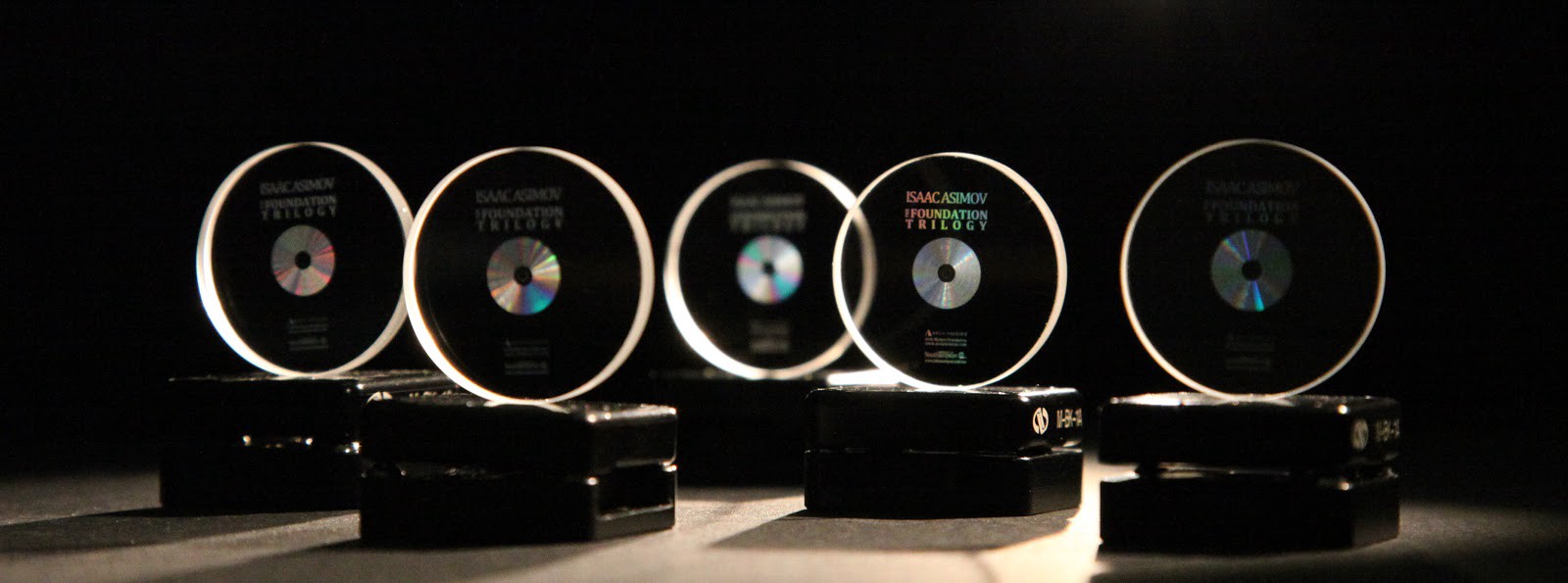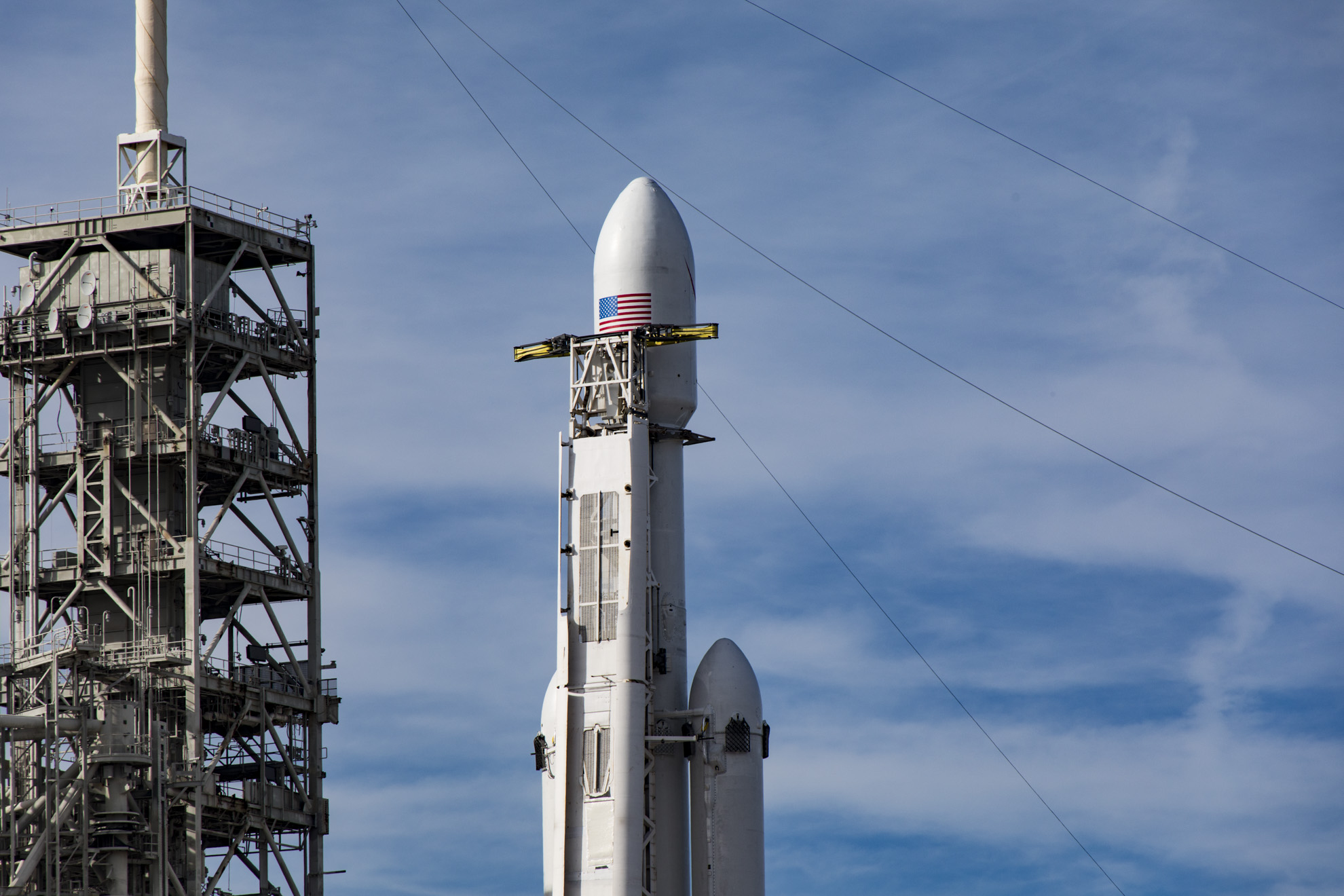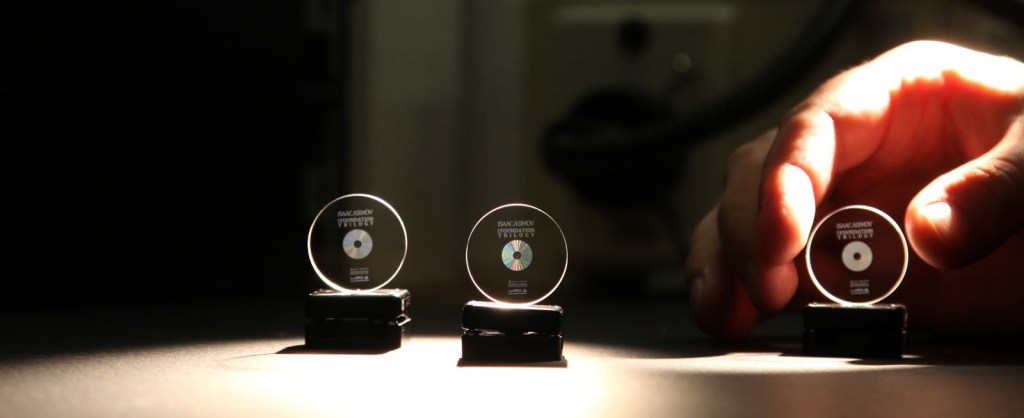On board the Tesla Roadster that Elon Musk sent hurtling towards the sun, aiming for a long, leisurely Earth-Mars orbit, there were a few pieces of miscellaneous cargo.
A so-called ‘Starman,’ which is a life-size mannequin wearing a production version of the SpaceX crew spacesuit; a miniature car created by Hot Wheels to commemorate the Roadster and its primary passenger; and something called an Arch (pronounced “Ark”), which is not so easy to summarily describe.The Arch on board is a data crystal (sort of like a Jedi Holocron if you’re mad for Star Wars lore) that contains all three books from Isaac Asimov’s classic Foundation trilogy. It’s actually a modest amount of data relative to the possibilities of the storage medium – in this case, a quartz silica structure which, using 5D optical storage techniques, can eventually achieve a max storage capacity of 360 terabytes on a disk just 3.75 inches in diameter.
But why shoot a tiny quartz disc into space? Why Foundation, and why aboard the Falcon Heavy, the crowning achievement of Elon Musk’s SpaceX private launch venture thus far?
First, while the disc itself and the technology behind it (developed by University of Southampton’s Dr. Peter Kazansky and his research team) is incredibly interesting (it’s expected to last for over 14 billion years, even accounting for outer space dangers including cosmic radiation) – it’s not the definition of what an Arch actually is. That, according to Arch Mission co-founder Nova Spivack, is actually something much more ambitious, broad in scope and technology agnostic.
The Arch Mission was actually inspired by Asimov’s Foundation series, which envisions an “Encyclopedia Galactica” that contains all the knowledge ever gathered by a civilization that has grown to galaxy-spanning scale. Spivack, along with co-founder Nick Slavin and a team that includes a number of council members from a wide range of background and industries, want to make this theoretical vision a functional reality – and the Arch SpaceX sent to space is the first, tiny piece of the puzzle.

Spivack explains that the Arch Mission isn’t about any one specific piece or even category of technology: The goal is essentially to build the largest, most resilient and most complete offsite backup ever created – an offsite backup of all human knowledge, spread across space in a variety of formats and mediums, with ample redundancy and hopefully multiple means of access.
“It really is a backup of civilization that’s designed to last for millions of years, and to do that effectively we have to have replication just like a large server farm would,” Spivack said. “In this case, our replication is solar system scale, which means that we’ll be putting archives literally around every planet in the solar system that we can get to. Think of it almost like Saturn’s rings, but in this case the ring will be tiny little crystals containing data.”
Just like how offsite backup is a smart idea for your home office because it means you’ll still have your data even if something happens to your entire house, like a fire or a flood, a galaxy-spanning repository of information provides something of an insurance policy in case of events like massive electromagnetic pulses, solar flares, or (and it hardly seems all that fantastic anymore) global thermonuclear war.
That’s not the only thing that a galaxy-wide encyclopedia can provide: If we achieve Elon Musk’s goal of becoming an interplanetary species, then we need to take into consideration how an interplanetary internet would work – Spivack notes that even transmitting at light-speed via lasers, it would take a long time for information to cross the distance of space, and so having a local database orbiting the Moon or Mars, for instance, would be a more practical option. Plus, far into the future, should any human colony somehow be cut off from Earth, or vice versa, it would be immensely useful to still have access to the sum total of human knowledge up to that point, for obvious reasons.
But how did Musk and SpaceX get involved? Twitter. Spivack told me about how he was lucky enough to catch the SpaceX CEO’s attention with a tweet about Arch Mission and Foundation, which Spivack chose as the first piece of information stored on an Arch after reading an article about Musk’s favorite books.
Asimov’s Foundation books should def be part of the mission. They’re amazing.
— Elon Musk (@elonmusk) December 2, 2017
The tweet eventually led to a meeting, at which Spivack presented Musk with one of the Archs encoded with Asimov’s seminal series. Musk was thrilled, according to Spivack, and immediately said he’d be adding it to his personal library. Spivack was taken aback; this was, after all, supposed to be an Arch destined to tag along on the Falcon Heavy payload’s trip to Mars – eventually, he agreed to provide Musk with not one, but two of the first five Archs, including one to keep and one to send off into the cosmos.
It’s no small feat to convince Elon Musk to not only pay attention to what you’re doing, but then to also load up your payload aboard his rocket and blast it into space just because he thinks you’ve got a good idea. But this accomplishment is just the start for Arch Mission and its plans, Spivack assures me.

Next, the non-profit organization (yes, it’s registered and is always seeking donations, Spivack says) is going to encode non-living DNA with other data sets, to be sent off on similar missions. The method is still in its relative infancy, but it has the potential to store tremendous amounts of data with incredible layers of redundancy, so that even if a portion is lost or damaged by cosmic rays, many more duplicates of the information will survive, for a very, very long time.
It’s crucial, Spivack says, that this be “non-living” DNA, since there are rules about sending out biological matter into the wider universe beyond our Earth, and for very good reason. But when I ask about whether Spivack has ever considered the possibility that a pan-galactic encyclopedia already exists, left by some other sentient race that we just haven’t noticed or figured out how to read yet, he admits that’s been a key founding idea all along Arch Mission’s development, and brings up an interesting idea about our own DNA as one example of how that might work.
“I started wondering whether there was a message somewhere for us to find,” Spivack told me. “And I started thought, well, where would that message be? If I was creating a message like that, I’d put it somewhere where I could guarantee it would be found, but it wouldn’t be found too soon.”
He continued that he’d also likely hide other clues related to the first in more difficult to access locations, so that as society progressed it could unlock additional information, but only when ready. The logical first place Spivack says he’d likely hide the first piece of the puzzle was in our own DNA, or in the DNA of something else we’re likely to observe as a sufficiently advanced species, including, for instance, an Apple. Our DNA and the DNA of other living things has long stretches of segments about which we understand little to nothing, he points out, so a message could be hidden there.
Ultimately, Spivack suggested that we can’t know right now if Arch Mission isn’t just an echo of a far-distant project currently beyond human understanding. But he does know that Arch is doing what it can today to make its vision a reality, including securing other launch partners, and berths aboard future missions to the Moon, Mars and the rest of the Solar System. There’s the non-living DNA project coming up, and Arch will also send a full archive of Wikipedia to space in one of its forthcoming forays.

Where it needs help, Spivack says, is in securing additional datasets to be added to the collection (he asked for both TechCrunch’s archive and Crunchbase, and we’ll certainly see about sending both because that’s definitely something crucially missing from space), as well as funding (they help fund research into different data storage methods through the foundation) and tip-offs to interesting research in the field. Spivack admits the idea can seem a little difficult to wrap your head around, but he also believes that it’s work that will have impact for humans now, since they’re spurring the development of tech and research that can be used in other ways.
There are obviously tremendous challenges ahead for Arch Mission, including how to encode the data so that it’s likely to be decipherable by future humans (or anyone else, for that matter), but the information is encoded in a number of different ways to make interpretation more likely. There’s also a matter of seeding physical information in the outer reaches of our galactic reach, but Arch has already hitched a ride on one rocket, so how hard can it be?































Comment